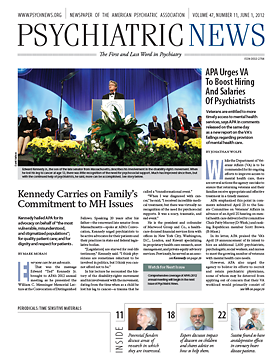Practical steps to measure and ensure the quality of assertive community treatment (ACT) programs are supported by scarce evidence, but a multi-pronged approach may help maintain ACT team quality and program fidelity until firmer ground is reached.
“[N]o single strategy is sufficient for ensuring adequate ACT implementation and services of consistently good quality,” said Maria Monroe-DeVita, Ph.D., director of the Washington Institute for Mental Health Research and Training and an acting assistant professor of psychiatry at the University of Washington School of Medicine, and colleagues in Psychiatric Services in Advance, published online April 15.
ACT programs have reported largely positive outcomes since their development 35 years ago, Monroe-DeVita and colleagues noted. These include fewer psychiatric hospitalizations, better retention in treatment, better housing stability, and more. However, programs show a mixed record in meeting basic standards over time, and that might be worrisome, said the authors. “[I]nadequate model implementation suggests less-effective services.”
In practice, numerous problems cause difficulties in maintaining fidelity to program ideals, said Robert Kiesling, M.D., medical director of Pathways to Housing in Washington, D.C., which operates four ACT teams. He was not involved with Monroe-DeVita’s research.
“It takes time to get up and running,” said Kiesling in an interview with Psychiatric News. “We have challenging patients with long histories of mental illness and chronic general medical ailments, and staff burnout is a fact of life.”
Monroe-DeVita and colleagues reviewed 57 articles published from 2000 to 2011, dividing them into four strategies that the programs use to maintain quality:
Policy and administration: “ACT programs need clearly defined practice standards,” they said, noting that several states have already mandated such standards. Licensing or certifying ACT programs is another way to hold programs to their original ideals. Adequate funding is critical, especially in a program’s early years, when start-up and recruitment costs are greater than reimbursements. “Funding strategies that support outreach efforts to consumers who may be difficult to locate or engage in services … are particularly crucial for ACT teams,” they said.
Training and consultation: Practice-based training and supervision are also important, said Monroe-DeVita and colleagues. “Even mature ACT teams … will often require ongoing, periodic consultation and training, especially given the high rate of turnover among staff at community mental health programs.”
ACT programs do need an outside look, said Kiesling. “Funders have a vested interest in how the organization is functioning.”
Team operations: Finding the right mixture of clinical skills, street smarts, pragmatism, and persistence is necessary but never easy, said the authors. “Experience in traditional office-based mental health programs is not necessarily a good predictor of success as an ACT team member, because ACT involves extensive outreach.”
When Pathways to Housing hires new staff, for example, it conducts an extensive interview process, but the candidate also spends time with the team as members work in the community, said Kiesling. Once on board, new hires spend two to three weeks taking didactic courses (like the D.C. Department of Mental Health’s day-long training) and shadowing staff on their rounds.
Program evaluation: “ACT teams rarely collect outcome data,” they noted. But they emphasized that staff should gather and evaluate regular measurements of frequency, duration, and type of services provided, along with consumer outcomes like employment, housing, symptom reduction, and psychiatric hospitalization.
Doing research at his program would require a full-time staff person, something Pathways to Housing can’t afford now, said Kiesling. Keeping up with the documentation required by insurers or Medicaid is time-consuming enough, he noted.
These approaches should be seen as “working hypotheses” for the moment, said the authors. “Additional rigorous research on implementing and sustaining the quality of ACT and other evidence-based practices is needed.”

